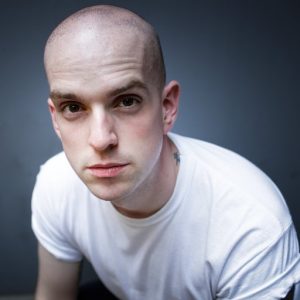Where did it all start for you? What made you want to be a poet?
I always wrote as a child, as I think a lot of people do, and then when I was about sixteen I started reading poetry again, after moving away from it a lot during my younger teenage years; so I started to emulate what I was reading (we’re all readers before we’re writers) and it seemed to me a great way of distilling the madness and confusion of the world.
How do you balance your writing alongside your job as a lecturer at Liverpool John Moores University? Do you have a writing routine?
I don’t really have a routine; on days when I’m not in my university office I still like to wake early, perhaps writing for an hour, before getting on with the rest of the day; if I have a commission or a specific piece I’m meant to be working towards, then that will often force me to sit down at my desk like a proper writer and try to conjure something up – but usually poetry comes to me very slowly and very unexpectedly – a line coming from wherever that place is that poetry comes from, and I’ll write that down and then just try to let it lead me wherever it wants to go.
Your poems are often personal and intimate. Human nature, desire and relationships are reoccurring themes. How difficult is it to put that part of you and that level of emotion down on paper?
I’m quite a shy, reserved person in many ways and so that level of intimacy is difficult; it just seemed to me that I was interested in relationships, in desire, in the body, and if I was going to write about those things then I had to fully commit and write about them entirely, there was no point doing it half-heartedly, or being embarrassed by it, the poems would only work (I told myself) if I went completely into them, if I told the whole truth (poetic truth rather than what-actually-happened truth sometimes); it can be difficult to visit parts of your life that weren’t particularly enjoyable, or which there is a certain degree of shame about, but that fear and embarrassment and emotion is important to feel – if you’re writing a poem cold then the reader will feel cold as well, there needs to be something transmitted to the reader, almost by osmosis.
Writing is never the hardest part in terms of revealing oneself; for the longest time the poems are just mine, in my notebook, and then the scary part comes afterwards.
Your poems are often lower case, with little punctuation and have fragmented stanzas. Why do you think this style and form works so well? ( I’m thinking in particular of Finally and David after Goliath. Both of which I think are beautiful. Every time I read David after Goliath I get something different from it, and I think that’s partly due to the form.)
It’s a style that developed over time, first lower case (which I began experimenting with after reading Children of Albion, a weird wonderful anthology of underground British poetry from the 1960’s) the fragments, or exploded lyric line with the breath spaces always just felt to me more natural, it seemed to me that people never spoke in correct punctuation, pausing where a comma might be etc., it’s something more led by the breath than that, something more gentle than that.
What advice would you give to new and aspiring writers?
To read, to read and to keep reading, and never lose that joy of reading; even read things you don’t enjoy, just to see why it is you don’t like it, to begin to form some kind of response to it. Remember that joy of reading, never lose that.
Do you think poetry is becoming more accessible?
I think it’s having a moment where it seems to be more popular, and I think forms are perhaps becoming more hybridised; I don’t think its necessarily a question of it becoming more accessible but rather that more people are coming to it – in troubling serious times, people always go to poetry – just as they might for a funeral.
Do you have a favourite poem or a writer whose work you keep returning to?
Always Thom Gunn, my first and always poetic love.
What are you reading at the moment?
I’ve just come out of the other side of all my marking, so slowly getting back into the swing of reading things – I’m looking forward to starting Michael Symmons Roberts’ new collection, Mancunia that Cape are publishing this year, and the great Randall Mann, a wonderful American poet, just sent me his new collection, so I’ve been reading that as well.
Do you have a poem or any recommendations you would like to share with us?
I would recommend that everyone takes out a subscription to a poetry magazine; Poetry(Chicago) The Poetry Review, Poetry London; magazines are a great way of seeing the coal face of poetry, where the really new and fresh poetry is coming out.
http://andrewmcmillanpoet.co.uk
Picture courtesy of Urszula Soltys.

